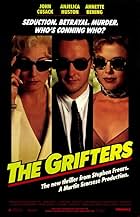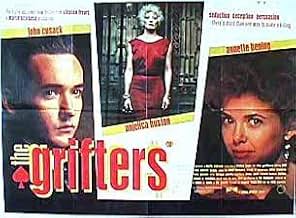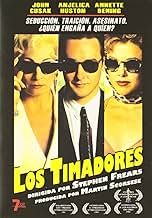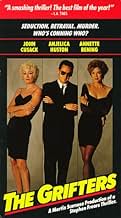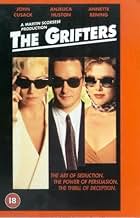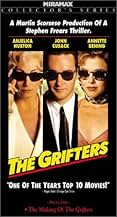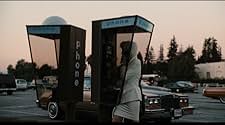Un petit escroc voit sa loyauté déchirée entre sa mère éloignée et sa nouvelle petite amie, qui sont toutes deux des arnaqueuses de haut niveau avec leurs propres règles du jeu.Un petit escroc voit sa loyauté déchirée entre sa mère éloignée et sa nouvelle petite amie, qui sont toutes deux des arnaqueuses de haut niveau avec leurs propres règles du jeu.Un petit escroc voit sa loyauté déchirée entre sa mère éloignée et sa nouvelle petite amie, qui sont toutes deux des arnaqueuses de haut niveau avec leurs propres règles du jeu.
- Director
- Writers
- Stars
- Nommé pour 4 oscars
- 11 victoires et 21 nominations au total
Avis en vedette
Roy Dillon (John Cusack) is a con man pulling small jobs every day to slowly build up his savings, while his girlfriend Myra Langtry (Annette Bening) is doing anything she can to get by and his mother Lilly (Anjelica Huston) is working on a long play of her own. The tagline of "Who's conning who?" always makes me roll my eyes, but it's actually an accurate portrayal here, as these three play each other back and forth, while the film itself is pulling the veil over the audience.
The Grifters is a brooding noir that throws back a lot to the '40s and it's Hitchcock roots, including some direct homages that feel appropriate for the story rather than cheap rip-offs. The film delves into some potentially melodramatic moments at times, but Frears is able to keep things in tune with it's seething roots as opposed to letting things get too theatrical.
All three actors are working at top form here; Cusack was just starting to break out and this role should really be considered more among the best of his career, Huston steals the show in every scene and Bening (someone I've always despised) is seductive and very compelling. I thought that Bening was phoning it in a bit at first, but as more is revealed about the character you realize that she's conning herself as much as she is everyone else. Frears crafts this one with a great tone that the actors play into very well, with some powerful sexual undertones and a dynamite finale.
It's all too good to be true for this neo-noir, even when Martin Scorsese's producing it. Then comes the actors – and my word, are they fantastic in their roles – John Cusack is sly yet undeterred in a role that is a slightly more edgier variation on Humphrey Bogart, with a cross of Lee Marvin, to boot; Annette Bening is simply drop-dead sexy as the woman who thinks she knows it all, yet is a timebomb waiting to explode. The real star of the show is Angelica Huston in a well-deserved Oscar nominated performance, perfectly balancing the ruthless, desperate act with a honest, focused, motherly concern that doesn't feel cliché at all.
Who knew modern day, sunny Los Angeles and Phoenix can be the backdrop of so seedy a neo-noir, perhaps the best since Chinatown? Frears, Huston, Cusack, Bening, Westlake, cinematographer Oliver Stapleton and composer Elmer Bernstein deserve all the praise they can get for creating something so seedy yet starkly beautiful in retrospect.
Excellently executed in the rhythms of a perfectly coiled con game about to be sprung with slick precision thanks to fine acting all around and a jolting climax thanks to a steady helm by director Stephen Frears.
This is called hedging. Hedging, whether in sports betting or in the stock or commodities markets works like an insurance policy. But it comes at a price. Take a simpler case. The Yankees are entertaining the Dodgers at Yankee Stadium. The line on the game is Yankees -200, that is, the Yankees are about a two to one favorite. If you want to bet on the Yankees you've got to put up $200 to win $100. If you bet on the Dodgers you put up $100 to win $200. (Actually, the "spread" or "vig" reduces that to $180.) Now suppose the bookie gets a couple of $10,000 bets on the Dodgers. Since his daily handle is usually about half that, he begins to sweat. Sure, he'll have a $20,000-day if the Yankees win, but what if the Dodgers win? Then he's out $36,000 dollars and maybe out of business. So what does he do? He hedges; that is he goes to a bigger bookie or to his Lilly in Las Vegas and lays off the action with a $20,000 bet on the Dodgers. Now if the Dodgers win he breaks even and lives to book another day. If the Yankees win, he still breaks even (instead of winning $20,000). But that's the price he pays for laying off, for hedging. Call it insurance.
Now the problem with all this in the movie is that Lilly cannot be at every race track in the country. So for Director Stephen Frears to make the action plausible he needs to show that Lilly's regular job is to hang out in California (by the phone!) to cover the West Coast tracks in case a lot of strange money comes in that the bookie needs to lay off. Presumably this is what Lilly is doing in the movie. For more realism, Frears could have shown Lilly hanging by the phone, working for several bookies.
Frears has a great cast and they do a fine job. But the plot contrivances keep this from being a really top notch noir flick. Worse stupidity is the scene in which Myra (Annette Bening) finds a motel key on her 100-plus key ring to open Lilly's motel door. Even though Lilly is on the run, apparently she doesn't bother with a second lock, or the chain lock. (Sure.) Second worse stupidity is Lilly sitting in the track's parking lot in full view of the grandstand overhead (although admittedly many feet away) with the trunk of her car open and a drawer full of money exposed for all the world to see. She doesn't have to play with her money in the parking lot. She can wait until she gets to her motel. But this contrivance allows Myra to see the money with binoculars. And as for Roy Dillon (John Cusack) hiding his money inside some strangely thick clown paintings in his living room...I don't think so. And Dillon finding one die on the floor of the dining room car of the train doesn't work either because later he has to "find" the other one (an action we don't see) so he can fleece the sailors with his loaded dice.
Not all the action is unrealistic however. Roy Dillon's little hustle with the flashing of the twenty and the switch to the ten is an actual con done innumerable times; and the reaction of bar keep who catches Dillon in the act is perfect, illustrating how people who work at cash registers feel about people who work little cons on them. And the business beginning when Lilly doesn't lay off the money on "Troubadour," and hears the very sad news on the radio that the horse actually wins the race, and then gets punished by her boss, is realistic because he is out some serious money. By the way, a person in Lilly's position, in effect becomes a bookie herself, if she wants to. She can bet a little less on the nag and pocket the change when the nag loses, as the nag usually will. Of course if she bets nothing, the tote board odds don't go down and so the bookie will know. Worse is when she doesn't bet and the nag comes in. Now she has to pay the bookie out of her own money. In the case of Troubadour, a 70 to one shot, obviously she couldn't afford to pay off and so had to take a beating, literary. The dialogue between her and Bobo (Pat Hingle) is perfect if you understand that he knows that she steals a little, here and there.
Be forewarned that the subplot is Oedipal and spicily played in parts. I'm sure Huston and Cusack had a few laughs off camera, but we are left not really knowing whether Lilly really is his mother or not. (Perhaps that's a good thing.)
All in all there's some nice grifter atmosphere in the movie and Cusack is interesting as a baby-faced little hustler, and Bening is sleazy, sexy and desperate, while Huston is both fawning and cowardly, and sneaky strong. But see this for Huston who makes a complex character real.
(Note: Over 500 of my movie reviews are now available in my book "Cut to the Chaise Lounge or I Can't Believe I Swallowed the Remote!" Get it at Amazon!)
Le saviez-vous
- AnecdotesIn a late 2013 interview, Anjelica Huston described this role as the most challenging one of her career.
- GaffesLily unscrews both light bulbs in the hallway outside Roy's apartment. In a following cut, Roy is seen entering his apartment from a well-lit hallway.
- Citations
Bobo Justus: [trying to get an explanation for Lilly's horse bet] You want to talk to me straight up?
Lilly Dillon: My son.
Bobo Justus: Your what?
Lilly Dillon: My son was in the hospital.
Bobo Justus: What the fuck are you doing with a son?
- Bandes originalesDo Ya, Do Ya Love Me?
Performed by Dream World
Words & Music by Pete Theodore and Emilie A. Bernstein (as Emily Bernstein)
Meilleurs choix
- How long is The Grifters?Propulsé par Alexa
Détails
- Date de sortie
- Pays d’origine
- Site officiel
- Langue
- Aussi connu sous le nom de
- The Grifters
- Lieux de tournage
- Bryson Hotel - 2701 Wilshire Boulevard, Downtown, Los Angeles, Californie, États-Unis(As Roy Dillon's hotel)
- société de production
- Consultez plus de crédits d'entreprise sur IMDbPro
Box-office
- Brut – États-Unis et Canada
- 13 446 769 $ US
- Fin de semaine d'ouverture – États-Unis et Canada
- 71 034 $ US
- 9 déc. 1990
- Brut – à l'échelle mondiale
- 13 446 769 $ US
- Durée1 heure 50 minutes
- Couleur
- Mixage
- Rapport de forme
- 1.85 : 1
Contribuer à cette page





